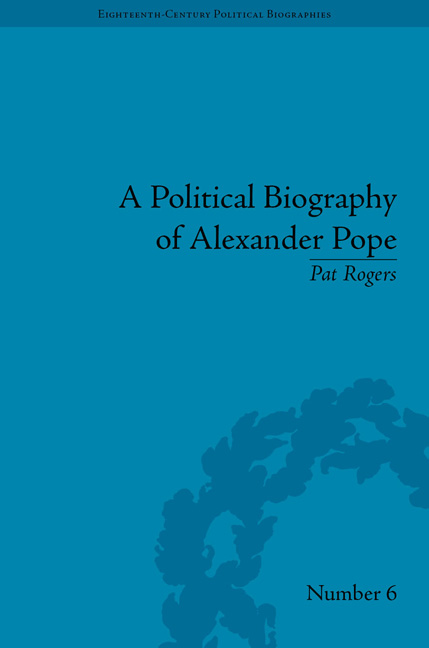Book contents
- Frontmatter
- CONTENTS
- Dedication
- Acknowledgements
- Abbreviations
- Dates and Quotations
- Sources
- Introduction
- Part I William and Anne, 1688–1714
- Part II George I, 1714–27
- Part III George II, 1727–44
- 7 Dunce the Second Reigns
- 8 Libels and Satires
- 9 Friendship and Opposition
- Epilogue: After Walpole
- Notes
- Works Cited
- Index
9 - Friendship and Opposition
from Part III - George II, 1727–44
- Frontmatter
- CONTENTS
- Dedication
- Acknowledgements
- Abbreviations
- Dates and Quotations
- Sources
- Introduction
- Part I William and Anne, 1688–1714
- Part II George I, 1714–27
- Part III George II, 1727–44
- 7 Dunce the Second Reigns
- 8 Libels and Satires
- 9 Friendship and Opposition
- Epilogue: After Walpole
- Notes
- Works Cited
- Index
Summary
Opposition is true friendship.
William Blake, The Marriage of Heaven and HellAt the start of June 1735 Bolingbroke suddenly decamped and went to stay in France, where he would spend most of his time for the next decade. He had always been given to impulsive acts, but this step took his friends by surprise. Long afterwards an Edwardian biographer, Walter Sichel, neatly summed up the restless quality of Bolingbroke's life by the chapter titles he chose: Rebellion, Recoil, Retirement, Recall, Rebuff, Retreat, Return. This new departure from England did indeed amount to a retreat. Having lost his battles with Walpole, Bolingbroke now quarrelled with William Pulteney, nominally co-leader of the opposition. Besides, the long campaign he waged in the Craftsman had yielded few tangible gains. The Prime Minister had weathered the Excise crisis, got through the general election and rallied the court party once more. By now many of his adversaries had lost faith in both of the chiefs of their faction. They were not sorry to see Bolingbroke head off for a comfortable home at Fontainebleau, where he devoted himself to composing high-minded historical and philosophical works. The first fruit was a treatise Of the True Use of Retirement and Study, dedicated to Bathurst. In part it composes a pièce justicative, in part a self-consoling reflection by Bolingbroke on his own enforced idleness and political impotence. For Pope, who had always been an outsider, the tract needed little explication.
Paradoxically, just at this the moment, the opposition started to regain momentum. They selected Frederick, Prince of Wales, as their figurehead, in the hope that the notoriously bad relations between Hanoverian monarchs and their heirs would play into their hands – as did happen, for a while. The Prince scarcely fitted the role of the ideal ‘patriot king’, whose qualifications Boling-broke would set out in his influential work published in 1739. But the treatise reflected the aspirations of the Prince's friends, among whom Pope figured at this time. The rhetoric of opposition demanded that the heir to the throne should espouse ‘virtue’, which in essence meant getting rid of Walpole and the machinery of government which kept him in office. The Prince visited Pope at Twickenham in October 1735, a symbolic gesture that was noted in the press.
- Type
- Chapter
- Information
- A Political Biography of Alexander Pope , pp. 201 - 224Publisher: Pickering & ChattoFirst published in: 2014



